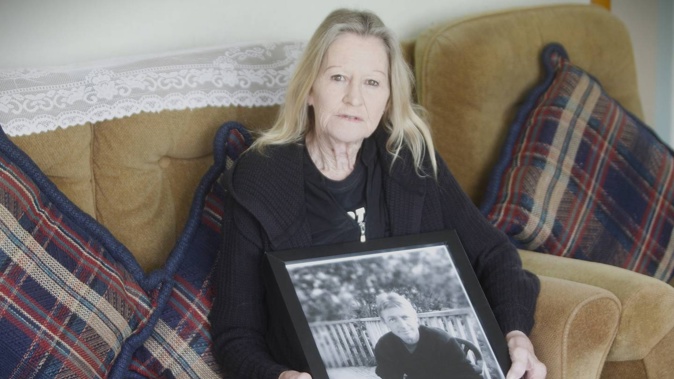

Warning: This story discusses mental illness and details that may upset some readers.
Glen Collins was one of a kind.
He was a father-of-two who laughed all the time, a barbeque king and a man who loved beer and rock music.
His kindness is something that is fondly remembered - it was also how he came to be killed by David Gilchrist, a man he opened his home to after discovering his new co-worker was sleeping rough in his car.
What the 45-year-old Wellington man didn’t know was Gilchrist had been avoiding police and health staff after absconding from treatment in Whangārei where he was under a compulsory treatment order.
Gilchrist was off his medication – but a series of miscommunications meant the man, who had a criminal background, significant history of mental health and a diagnosis of schizophrenia, slipped through the cracks.
In Deputy Chief Coroner Brigitte Windley’s recently released inquest findings, the tragic timeline of missed opportunities was laid out in detail.
His mother, Karilyn Collins, told NZME after reading all 96 pages what haunts her is that Gilchrist had been released from police custody the day before her son was killed in September 2018.
“Glen would be alive today if things were set in place,” she said.
“He didn’t deserve to go that way, it’s not fair those boys [his sons] have to endure so much pain and suffering.
“I have some moments and I just cry and cry and cry, my heart shattered when Glen went part of my heart went.”
/cloudfront-ap-southeast-2.images.arcpublishing.com/nzme/ZC5XR67ANVFLNPQL4GBKMSYTSA.jpg) Glen Collins was killed in 2019 by David Gilchrist, a mentally unwell man who he welcomed into his home. Photo / Supplied
Glen Collins was killed in 2019 by David Gilchrist, a mentally unwell man who he welcomed into his home. Photo / Supplied
Collins was stabbed to death in an unprovoked attack at his partner’s Upper Hutt home in September 2018 when Gilchrist plunged a 20cm stainless steel blade into his back, neck and torso. The blade punctured his heart and neighbours’ attempts to save his life were futile. He died at the scene.
When Gilchrist was arrested he was found to have had a psychotic relapse because he’d stopped taking his medication. He confessed the same day and was charged with Collins’ death but found not guilty by way of insanity in the High Court at Wellington in March 2019.
Since his death, Karilyn said the family had never been the same.
“We’ve got to go through anniversaries, birthdays, at Christmas time he’s not around the table.
“It’s horrible, words can’t describe it... It doesn’t get any better and it will never get any better until I take my last breath, I’ll never get over this.”
Rewind a few weeks and Gilchrist had left Northland without telling DHB staff in charge of his treatment order. On August 30, the then-Northland DHB clinical team reported him missing to police. His “imminent risk” was included in the report, but not his community treatment order.
On September 5, two alleged petrol driveoffs were entered on his police file. Gilchrist was stopped for speeding a day later and the officer who pulled him over said he seemed “calm and collected” when a search of his details showed he was reported as missing.
Gilchrist told the officer he was aware he was missing and “needed to return to sort it out”. The officer said he did not see any alerts about the petrol drive-offs. With no power to arrest based solely on a missing person alert Gilchrist was given an infringement notice and continued on.
”If Gilchrist was such a high risk to be located and assessed by the CAT team, the DHB at Whangarei should have sought a ‘warrant to arrest’ instead of a missing persons report,” the officer said.
A few weeks later Gilchrist was arrested in the early hours of September 19 after police spotted his car and ran his registration, which flagged the petrol drive-offs and that he was a missing person.
He was taken into custody so the missing persons flag on his file could be assessed but communication between agencies, including mental health support lines who did not elect to assess him, meant he was released from custody.
He killed Collins the next day.
Coroner Windley found failing to act on the missing person’s report was a significant failure by Northland police and meant vital opportunities to locate Gilchrist were missed.
His arrest on September 19 should have resulted in an urgent mental health assessment, something the coroner said would have most likely resulted in him being recalled to a mental health in-patient facility.
She also said there were systemic failings by the Northland police in how they dealt with missing person files, an issue that had been ongoing since 2016.
“It is obvious from the foregoing that there was no communication of risk within Northland District Police, or from Northland District Police to anyone else.”
/cloudfront-ap-southeast-2.images.arcpublishing.com/nzme/SW3ODRPU7VCRVFEZKBPMQL2VIM.JPG)
Despite it being known Gilchrist was in the Wellington region, the then-Capital and Coast District Health Board did not accept Northland DHB’s attempts to pass on more detailed information.
“Tragically, central to the events in this case were multiple failures of communication... at every stage of communication along the chain, the information about Mr Gilchrist’s risk became progressively diluted.”
Coroner Windley made several recommendations, most of which have been “largely implemented”.
They included updated systems for police in dealing with missing person files, Northland DHB updating language used to reflect risk assessment, and the CCDHB developing electronic flags for missing people of concern.
/cloudfront-ap-southeast-2.images.arcpublishing.com/nzme/HSCPD2TLZZH7TOAJOLMQNXPQY4.jpg) Another picture of Glen Collins sits on a shelf in Karilyn's home. Photo / Hazel Osborne
Another picture of Glen Collins sits on a shelf in Karilyn's home. Photo / Hazel Osborne
Karilyn Collins said Coroner Windley’s finding felt like her son was no longer a statistic. She hopes changes made will mean no other family will have to face such tragedy.
“I would not wish this upon anyone else it’s just horrific,” she said. “Words can’t explain how you feel, it’s devastating.”
However, she still feels no one has been held accountable for the death of her son.
“How do they sleep at night because they must know they failed.”
Agencies committed to change
A police spokesperson told NZME the coroner’s findings had been accepted and acknowledged, particularly the inadequate management of missing persons.
They said a review of management of missing persons has since been completed since Collins’ death, and changes have been made to the process.
The spokesperson acknowledged Collins’ family and the grief they have experienced since his death.
“Glen’s death was a terrible tragedy and police extend their condolences to his loved ones as they navigate life without him.”
Te Whatu Ora Health NZ has also accepted the findings and acknowledged the “pain and distress” Collins’ family suffered.
“We extend our sincerest condolences,” said Dr Murray Patton, Te Whatu Ora’s Clinical Lead, Specialist Mental Health and Addiction Services.
Patton said a number of changes were implemented by both districts following an external joint review and Te Whatu Ora is also in the process of reviewing the coroner’s recommendations and considering their implementation.
Hazel Osborne is an Open Justice reporter for NZME and is based in Te Whanganui-a-Tara, Wellington. She joined the Open Justice team at the beginning of 2022, previously working in Whakatāne as a court and crime reporter in the Eastern Bay of Plenty.
Where to get help:
• Lifeline: Call 0800 543 354 or text 4357 (HELP) (available 24/7)
• Suicide Crisis Helpline: Call 0508 828 865 (0508 TAUTOKO) (available 24/7)
• Youth services: (06) 3555 906
• Youthline: Call 0800 376 633 or text 234
• What's Up: Call 0800 942 8787 (11am to 11pm) or webchat (11am to 10.30pm)
• Depression helpline: Call 0800 111 757 or text 4202 (available 24/7)
• Helpline: Need to talk? Call or text 1737
If it is an emergency and you feel like you or someone else is at risk, call 111.

Take your Radio, Podcasts and Music with you









